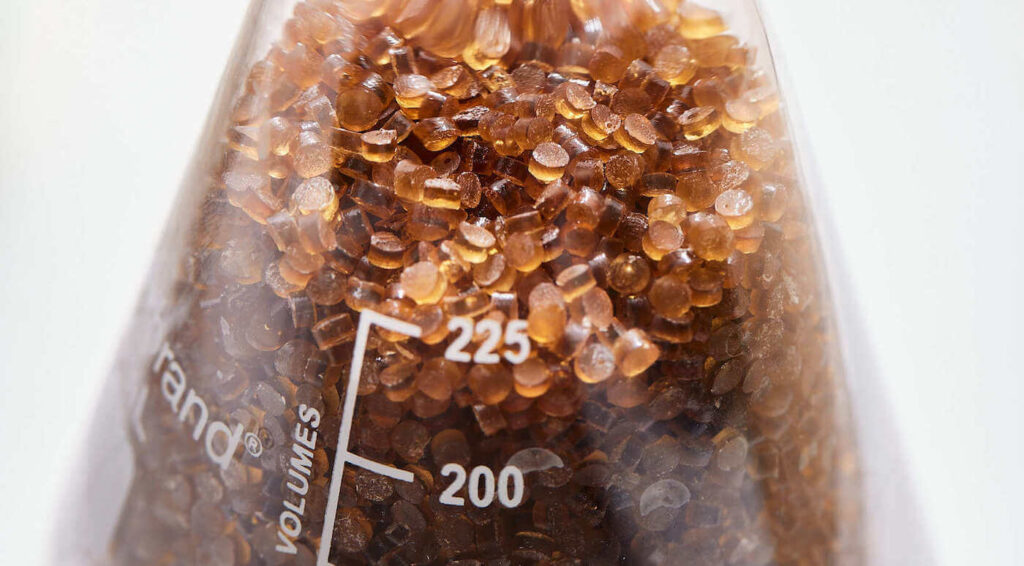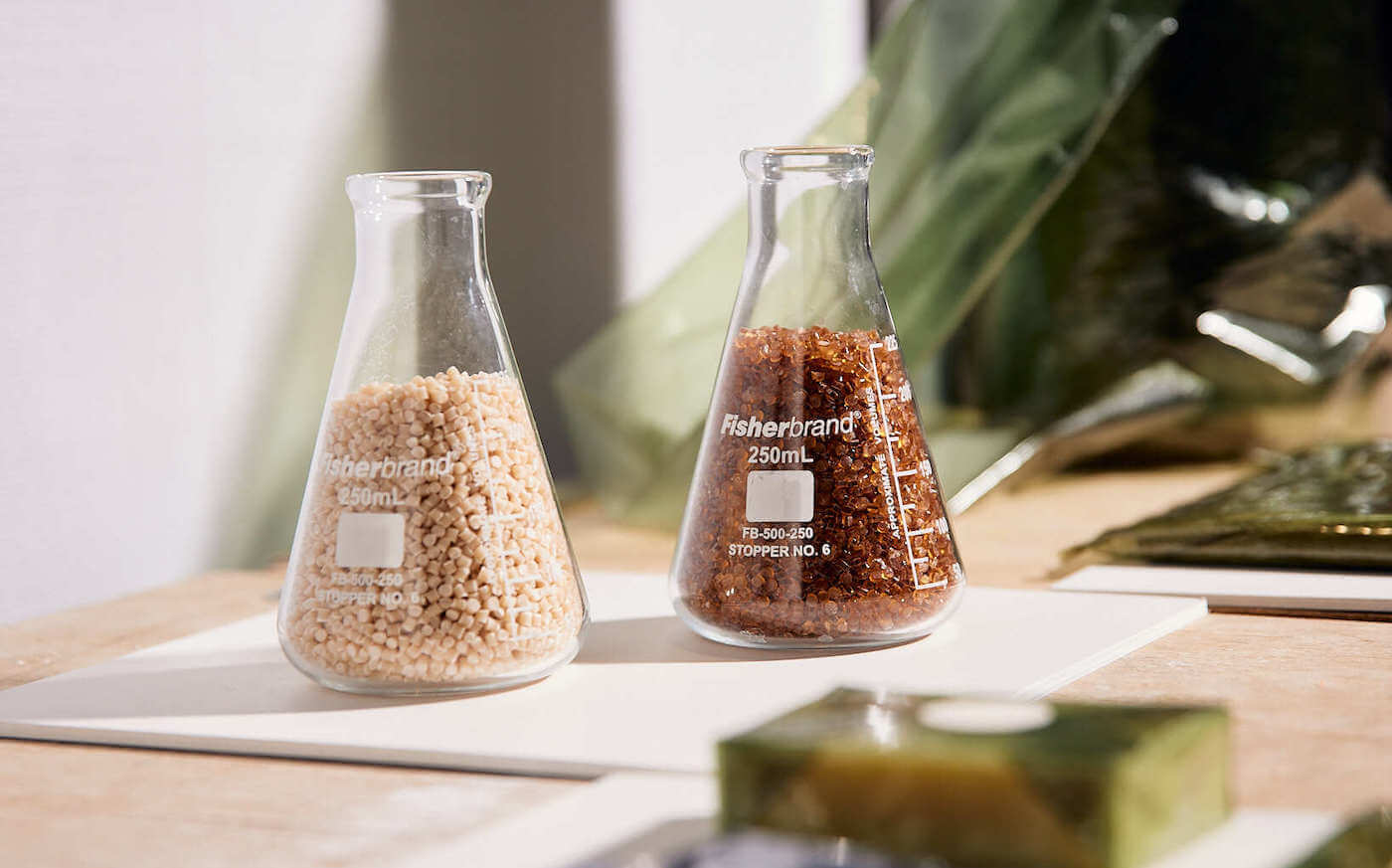
Sway has been awarded a U.S. National Science Foundation (NSF) Small Business Innovation Research (SBIR) research and development grant of $272,000 to evolve and scale the next generation of their melt-processable, home-compostable seaweed resin.
Today, the commercial plastic packaging industry heavily relies on the polymerization of petroleum derivatives, which undergo compounding or melt processing before being transformed into finished products. This dependence on petroleum-based materials faces mounting challenges, including consumer backlash against plastic waste, evolving domestic and international regulations, persistent pollution across urban and natural environments, and the need to reduce our reliance on the fossil fuel industry in the face of climate change. Consequently, there is a growing demand for compostable packaging solutions to serve the expanding biodegradable packaging market, which is projected to reach $714 billion by 2030.
Sway’s breakthrough technologies are replacing conventional, petroleum-based resin by shifting feedstock reliance toward renewable sources like seaweed – a crop which replenishes ecosystems as it grows. Sway’s Thermoplastic Seaweed Resin (TPSea) has the potential to transform seaweed into flexible packaging applications like polybags, retail bags, mailers, pouches, and food packaging – a category representing approximately 40% of all fossil fuel-derived packaging. Furthermore, Sway is designing their material technology to seamlessly integrate with conventional plastic manufacturing infrastructure, streamlining a path to commercial scale and price parity.
“Our goal is to bring materials that replenish the planet into the mainstream,” says Julia Marsh, Sway CEO & Co-founder. “With backing from one of the most prestigious science organizations in the world, Sway is poised to evolve our home-compostable seaweed resins at a scale that will meaningfully support ocean farmers and transform the packaging materials we interact with daily.”
Among the exciting focus areas of the SBIR grant, support from the NSF will directly help Sway further expand the diversity of their feedstock portfolio, including unrefined seaweed, processing by-products, and invasive macroalgae. Unrefined seaweed removes a major step of processing, resulting in boosted American bioeconomy opportunities, expanded business opportunities for farmers who lack access to processing infrastructure, and streamlined supply chains – enabling domestic manufacturing and the re-shoring of value chains.

“NSF accelerates the translation of emerging technologies into transformative new products and services,” says Erwin Gianchandani, NSF Assistant Director for Technology, Innovation and Partnerships. “We take great pride in funding deep-technology startups and small businesses that will shape science and engineering results into meaningful solutions for today and tomorrow.”
All proposals submitted to the NSF SBIR/STTR program, also known as America’s Seed Fund powered by NSF, undergo a rigorous merit-based review process. Once a small business is awarded a Phase I grant, it becomes eligible to apply for Phase II funding and additional supplements totaling up to $2 million. To get started, startups or entrepreneurs submit a written Project Pitch to see if their technology idea could be a good fit for the program. To learn more about America’s Seed Fund powered by NSF, visit https://seedfund.nsf.gov.
NSF has several programs that help accelerate the translation of research results to practice and provide pathways for researchers, startups, and aspiring entrepreneurs to move their ideas from the laboratory to the market and society. To learn more about how NSF helps unlock future technologies for national and societal impact, visit: https://beta.nsf.gov/tip/latest.
About Sway
Sway is a cleantech startup scaling seaweed-based, rapidly compostable replacements for plastic. Their patent-pending products match the vital performance attributes of plastic packaging and are designed to plug into existing infrastructure, enabling scale and competitive pricing. Unlike plastic, however, Sway materials are made from an abundant, regenerative resource and decompose into healthy soil after use.
In 2023, Sway won 1st place in the TOM FORD Plastic Innovation Prize powered by Lonely Whale. In 2021, Sway also won the Beyond the Bag Challenge sponsored by Closed Loop Partners and a consortium of major retailers. Sway’s solutions have garnered recognition from Vogue, Forbes, Condé Nast, Business Insider, and Fast Company. As a member of the Sustainable Packaging Coalition, UN Global Compact, Sustainable Ocean Alliance, and 1% for the Planet, Sway is working holistically to scale their products for a thriving, equitable future. Sway is headquartered in the California Bay Area.
About the U.S. National Science Foundation’s Small Business Programs
America’s Seed Fund powered by NSF awards more than $200 million annually to startups and small businesses, transforming scientific discovery into products and services with commercial and societal impact. Startups working across almost all areas of science and technology can receive up to $2 million to support research and development, helping de-risk technology for commercial success. America’s Seed Fund is congressionally mandated through the Small Business Innovation Research program. The NSF is an independent federal agency with a budget of about $9.5 billion that supports fundamental research and education across all fields of science and engineering.
Source
Sway, press release, 2023-10-10.
Supplier
National Science Foundation (USA)
Sway
Share
Renewable Carbon News – Daily Newsletter
Subscribe to our daily email newsletter – the world's leading newsletter on renewable materials and chemicals










